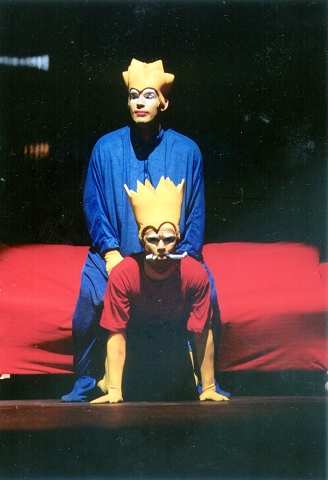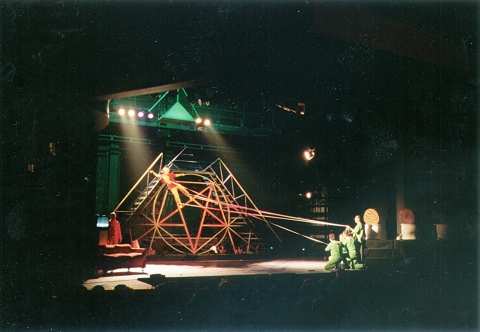|

Swashbuckling parody
RODERIC DUNNETT attends the Hungarian première
of Maxwell Davies's Expressionist opera 'Resurrection'
In 1962, Peter Maxwell Davies, fresh from his pioneering teaching work
in Cirencester, crossed the Atlantic to study in Princeton with Earl Kim,
Roger Sessions and Milton Babbitt. Freed from classroom demands, he was
able to turn his mind to the major opera he had long had in mind : an ultra-Expressionist,
post Wozzeck, in both dramaturgical and musical terms brilliantly
structured large opera based on the life of the Tudor composer John Taverner.
Like Hindemith's Matthias Grünewald or Pfitzner's Palestrina (both
were arguably influences), Taverner for Davies became both an alter ego
and a classic Everyman figure -- buffeted into betrayal of his own ideals
by an unsympathetic world and a treacherously antagonistic political climate.

But another idea was hatching in Maxwell Davies's mind. Not yet thirty,
he could see all around him the grimmer, ever-present dangers of booming,
consumer-driven, unequal postwar society -- the uglier, downside legacy of
the 1930s Roosevelt revival and 1950s boom -- tantalising those around him
with longings for things they couldn't afford, shamelessly wooed by competitive
well-heeled corporations for money they did have. A society of winners,
but also of victims. At the same time, he could acutely remember the social
buffeting a youngster -- even he, hailing from an upwardly mobile lower middle
class family -- might experience growing up in a largely philistine postwar
Britain, forever lectured and hectored, silenced and -- in effect -- brutalised
by a working-class (in his case, northern) society which by and large viewed
artists as cissies and young dissentients as a social disease.

From this was born Resurrection (completed 1987) -- Maxwell Davies's
second full-length large opera, although its libretto was virtually complete
by the time he returned from America in 1964. It is, in a sense, the black
comic 'obverse' of Taverner, and Balazs Kovalik's production at the Thalia
Theatre for the Budapest Öszi Festiväl (first staged -- to massive
acclaim -- at the Budapest 'Island' pop festival in summer 2001) played tellingly
on this idea of reversal, giving prominence almost unconsciously to Davies
Leitmotifs ubiquitous elsewhere (wheel of fortune, Antichrist, shrieking
deified countertenor, inherently diseased and oppressive officialdom). Indeed,
the climax of the opera -- as the libretto conceived it, albeit not actually
realised here (the weakest point in Kovalik's production) -- involves the
'resurrection' of the central character as, if not a 'terrorist', a classic
Campus mass-killer.
Continue >>
Copyright © 20 January 2002
Roderic Dunnett, Coventry, UK
 A REVIEW OF 'MR EMMET TAKES A WALK'
A REVIEW OF 'THE TURN OF THE TIDE'
THE MAXWELL DAVIES WEBSITE
<< Music
& Vision home
Tosca >>
A REVIEW OF 'MR EMMET TAKES A WALK'
A REVIEW OF 'THE TURN OF THE TIDE'
THE MAXWELL DAVIES WEBSITE
<< Music
& Vision home
Tosca >>
|

